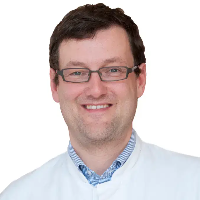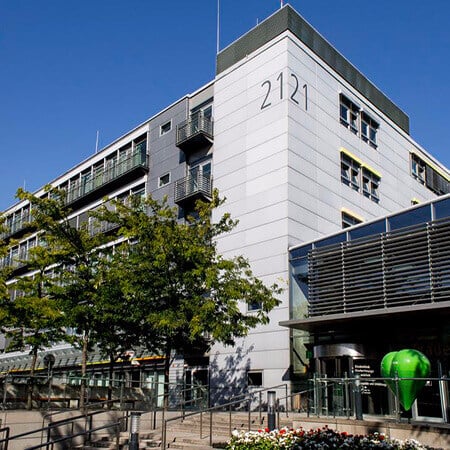Chemotherapy and Radiotherapy for Glioblastoma (brain Cancer) treatment in Germany
Treatment prices are regulated by national law of the corresponding countries, but can also include additional hospital coefficients. In order to receive the individual cost calculation, please send us the request and medical records.

Department of Radiation Therapy
According to the Focus magazine, the University Hospital of Ludwig Maximilian University of Munich is regularly ranked among the best medical institutions in Germany! The hospital is the largest multidisciplinary medical facility, as well as a leading research and training center in Germany and Europe. The hospital is proud of its bicentenary history and tirelessly confirms its primacy at the national and international levels. The outstanding quality of medical care is complemented by highly productive research activities, thanks to which many effective diagnostic and therapeutic methods, saving people’s lives, have been presented in medical practice.







Department of Radiation Therapy
According to the Focus magazine, the Department of Radiation Therapy ranks among the top German medical facilities in the area of its specialization! The department offers all types of modern radiation therapy for cancer treatment at the highest level of university medicine. The priorities of the department's work include the treatment of tumors of the gastrointestinal tract, urogenital system in men, gynecological tumors in women, oncopathologies of the nervous system, as well as head and neck tumors. Each department's specialist strives to ensure all the patients with the most effective and at the same time customized treatment. Due attention is also paid to radiation protection.






Department of Radiation Therapy, Radiation Oncology and Proton Therapy
The Department of Radiation Therapy, Radiation Oncology and Proton Therapy offers the full range of modern radiation therapy at the highest medical and technological level. Innovative proton therapy is also within the competence of the medical facility. As the largest medical facility of this kind in Eastern Saxony, the department annually admits about 2,300 cancer patients, 550 of whom are treated on an inpatient basis. In total, the department has about 110 employees, including 26 doctors, 14 physicists, 22 radiological assistants, 22 nurses and 28 employees of various profiles (in radiation biology research laboratories and other sections). The department's doctors cooperate closely with oncologists, chemotherapists and other specialists in related fields, since cancer patients usually require comprehensive treatment that combines several methods. In most cases, patients undergo radiation therapy on an outpatient basis, which eliminates the need for hospitalization. The main value of the department's medical team is the patient's health, so doctors always strive to provide qualified medical care that meets the individual needs of the patient.





Malignant processes of the central nervous system are not that common. Although more often, brain cancer affects middle-aged and older people, children are also not immune to the disease. Diagnostics and professional treatment in Germany make it possible to successfully cope with the brain cancer that was previously considered incurable.
The main symptoms of glioblastoma
The success of brain cancer treatments in Germany often depends on early disease detection. Brain cancer can be present for a long time without symptoms. Therefore, it is usually found at the advanced stages. Common symptoms of brain cancer include:
- Headaches
- Dizziness
- Impaired vision and speech
- Impaired coordination
- Forgetfulness
- Paralysis
- Nausea and vomiting without gastrointestinal problems
Diagnostics of glioblastoma
Diagnostics of brain cancer begins with a medical history taking and examination of the patient by a qualified doctor. A doctor can evaluate the nature of the process, the location of the tumor, and the dynamics of brain cancer progression. The neurological picture and the mental state of the patient are taken into consideration as well.
The first thing to find out is the nature of the tumor (benign or malignant). Already at this stage, it is necessary to use precise screening techniques, since errors in diagnostics have unfavorable consequences for the patient.
The next issue to estimate is the source of brain cancer. Tumors of the central nervous system are of two kinds: primary, developing from cells of cerebral structures, and secondary or metastatic. Primary tumors can grow from the cells of the brain substance or its membranes. Finding out the source of the process is necessary to choose the most effective clinical treatment of glioblastoma.
Clinical blood tests are mandatory. The next indicator is tumor markers. By their presence (or absence) and level, doctors specify how aggressive brain cancer is.
Cerebrospinal fluid (CSF) analysis also provides valuable information. Atypical cells are found in the cerebrospinal fluid, which helps to indicate other changes in the functioning of the body. If there are no problems with CSF, then this is also an important diagnostic indicator.
The full list of diagnostic procedures is broad enough, and includes:
- Electroencephalography (EEG)
- X-ray of the skull
- Contrast-enhanced computed tomography
- Functional magnetic resonance imaging
- Angiography of cerebral vessels
- Ultrasound examination of cranial structures
Glioblastoma treatment in Germany
In hospitals in Germany, brain cancer treatments begin with diagnostics carried out using cutting-edge equipment, which makes it possible to detect any tumor even in the absence of pronounced manifestations.
Only highly specialized medical care with the involvement of high-tech and progressive methods of brain cancer treatment can guarantee recovery. All of these are offered by hospitals in Germany.
German doctors study the brain in detail to detect the tumors because brain cancer is often caused by metastases from other organs. Hospitals in Germany rank first in the number of successful treatment procedures for brain cancer.
Besides, relapses after the treatment of glioblastoma are most rare here. Treatment of brain tumors in hospitals in Germany at a high level due to the qualifications of specialists and the availability of modern technical equipment.
Methods of brain cancer treatment in Germany
As with many other forms of brain cancer, diverse approaches are applied in the treatment of glioblastoma, such as:
- Surgery.
Surgeries are carried out in case of the presence of distinctive tumor boundaries and the absence of metastases.
In many cases, surgery helps in the treatment of various types of brain cancer.
- Chemotherapy.
Difficulties with chemotherapy treatments are associated with the fact that not all chemotherapy drugs penetrate the barrier between the brain tissue and blood capillaries.
The achievements of the German pharmaceutical industry, which guarantee the maximum effectiveness of the drugs selected by the doctor, allow expecting a successful outcome.
Anti-tumor chemotherapy courses, selection of drugs, frequency, and the number of injections are prescribed individually, according to the results of prior examination.
The type of drug (or drugs) for chemotherapy is selected taking into account various factors, such as:
- Research data.
Almost a century ago, doctors started to apply chemotherapy to fight glioblastoma, and many different drugs have appeared since. Throughout all this time, clinical studies were carried out, the results were documented, and the effectiveness of standard and new treatments was constantly compared. This information has helped to elaborate basic protocols (types of drugs, doses, and treatment schedules) for certain types of cancer, stages of its development, and patient’s individual features. Currently, there are standard protocols that guide the doctor in the choice of the correct chemotherapy regimen.
- The level of positive clinical response.
- The health state of the patient.
Chemotherapy is toxic. It must be administered with caution, even in physically fit people with cancer. Elderly patients may not be able to tolerate certain chemotherapy protocols due to the high risk of severe side effects. In such cases, at the stage of prescribing treatment of glioblastoma, the possible risks and benefits of using chemotherapy are estimated carefully. Simply put, the inevitable damaging effects should not be greater than the potential benefit of the drug.
In some cases, to reduce toxicity and side effects, the doctor may prescribe only one drug instead of a standard drug combination. In other cases, the doctor and patient may decide not to administer chemotherapy, but to take other measures in order to preserve the quality of life.
- Radiation therapy.
Nerve cells are resistant to radiation therapy. Due to this feature, high-energy radiotherapy is effectively used to treat various types of brain cancer.
Radiation therapy uses powerful rays to treat cancer. Radiotherapy destroys cancer cells and makes it difficult for them to reproduce. After that, the body can naturally get rid of the destroyed cancer cells. Radiation therapy also affects normal cells. However, normal cells, unlike cancer cells, can repair themselves.
Radiation therapy can be used to treat primary brain tumors or tumors that have metastasized. The doctor decides if the patient will benefit from partial or total brain radiotherapy. Depending on the treatment plan, the patient can receive either external beam or stereotaxic radiotherapy.
During the external beam radiotherapy, the device directs beams of radiation to the tumor. The beam travels through the patient's body and destroys cancer cells in its path. Patients cannot see or feel radiation therapy in action.
Stereotactic radiotherapy can be used to treat certain types of malignant tumors and works with great precision. The radiation is directed at a small area of the brain. That is why the tumor is exposed to high radiation doses, and the normal nearby tissues receive minimal doses of radiation. The tumor is exposed to increasingly higher doses of radiation during each radiotherapy treatment session, which is going to shorten the overall course of radiation therapy.
It takes time for radiotherapy to work. Cancer cells begin to die after a few days or even weeks of treatment, and they will continue to disappear in the following several weeks or months after radiation therapy completion.
Before starting the treatment, the patient needs to go through a radiotherapy planning procedure. It is designed to ensure that the placement of the patient during the procedure is precise. The patient is scanned and marketed with small dots above the skin. These marks indicate the area of beam direction.
The radiation therapists guide the patient to the treatment room and help him lie down on a table. They are positioning him in the same manner in which the procedure itself is going to be conducted.
When the patient is in the correct position, the radiation therapists leave the room, close the door, and begin treatment. The patient won't see or feel the radiation, but he can hear the unit as it moves around, and as it turns on and off. The patient is in the treatment room for 15 to 90 minutes depending on the treatment plan.
Although the patient is alone during treatment, the radiation therapists constantly see him on the monitor. They make sure that the patient feels comfortable during treatment. However, if he feels uncomfortable or needs help, doctors can turn off the device and provide the patient with necessary help.
Some people may have side effects from radiation therapy. The type of side effects and their severity depend on many factors, such as the dose of radiation, the number of treatments, and the overall health state of the patient. Side effects may be more severe if the patient receives chemotherapy at the same time.
Cost of treatment in Germany
The cost of treatment in Germany, namely in hospitals listed on the Booking Health website, is relatively low. As a rule, you can save up to 40% of the hospital’s prices by booking the medical program here.
With Booking Health, you can undergo the treatment of glioblastoma at an affordable price. The cost of treatment in Germany varies, as the prices depend on the hospital, the diagnosis, and the complexity of treatment. The cost of treatment for glioblastoma is in the price range from 24,500 EUR to 45,886 EUR.
Where can I undergo chemotherapy or radiotherapy for glioblastoma?
Among hospitals in Germany, the best success rates in the treatment of glioblastoma are demonstrated by:
- Gamma Knife and Radiotherapy Center Krefeld
- MediClin Robert Janker Clinic
- University Hospital of Ludwig Maximilian University of Munich
- University Hospital Frankfurt am Main
- University Hospital Carl Gustav Carus Dresden
How can I undergo glioblastoma treatment in Germany?
Organizing the treatment of glioblastoma in hospitals in Germany by oneself can be challenging. It is safer, easier, and less stressful to shift some responsibility onto a medical tourism agency that will support you throughout your journey.
Booking Health will facilitate the organization of treatment in Germany by taking care about the following issues:
- Translation of the documents
- Communication with the clinic
- Assistance in obtaining a visa to Germany
- Booking tickets and transfer
- Accommodation booking in Germany for the period of treatment, or anything related to a comfortable stay in the country
We will also help to find the most suitable clinic for you among hospitals in Germany. It’s practically impossible to do this on your own, as it requires specific knowledge and experience in medical tourism.
It is in our power to do everything to make the treatment in hospitals in Germany as comfortable as possible.
If you want to get more information on the right clinic for your disease or on the cost of treatment in Germany, please leave a request on the Booking Health website. We will contact you as soon as possible, and answer all of your questions.

